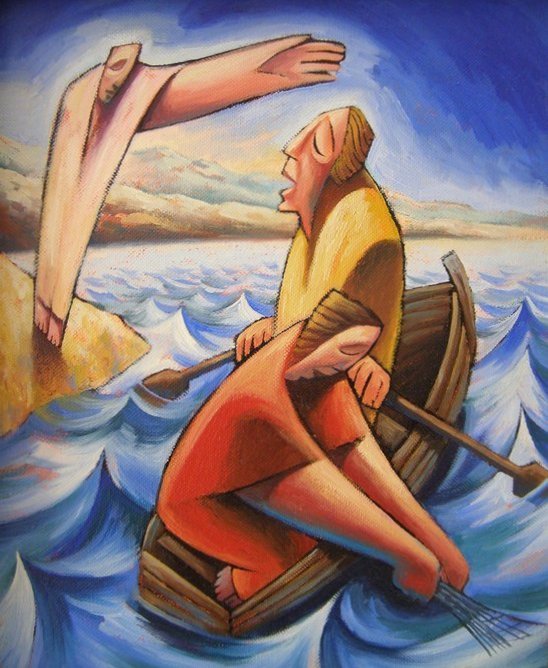
Just as day was breaking, Jesus stood on the shore;
yet the disciples did not know that it was Jesus. (John 21:4)
Lap lulled by lifeless waters,
ill-cast nets bearing no weight,
the fishermen see against
charcoal dawn
the lone figure of the Lord—
come to draw them in again,
and launch them out.
This poem is No. XXXII from 33: Reflections on the Gospel of Saint John by Andrew Roycroft (Baltimore: Square Halo Books, 2022). Used by permission of the publisher.
Roycroft’s poems from the collection 33 are remarkable for their concision, especially this one based on John 21. There’s so much richness packed into these seven spare lines, about resurrection, restoration, plenitude, calling. The rabbi Jesus whom they had followed for three years and staked all their hopes in had died; he was executed by the state. Disappointed and forlorn, and some perhaps ashamed by their abandonment of him in his hour of deepest need, the disciples return to their livelihood as fishers. But their first night back at sea proves fruitless, yields no catch; the waters are dead, like their Lord. Or so they thought.
A voice from the shore yells out to them, telling them to cast their nets on the right side of the boat. Skeptically, they do, and the nets fill with such an abundance of fish that the men can barely heave them up. It’s then that they recognize the voice as that of their beloved Jesus. Peter cannot contain his joy and jumps into the sea, splashing his way to reunion with the one he had denied knowing just the previous week.
Jesus and friends then have a fish barbecue breakfast on the beach. He redeems Peter and removes his guilt by asking him three times, “Do you love me?,” giving him the chance to respond triply in the affirmative, counteracting the three no’s he had spoken the other night outside the house of Caiaphas. “Then feed my sheep,” Jesus says. Peter would go on to show his love for Jesus by doing just that, playing an instrumental role in the early church.
Luke places the episode of the miraculous catch of fish at the beginning of Jesus’s ministry, when Jesus calls his very first disciples (see Luke 5:1–11). That this episode bookends the Gospels speaks of second chances and the persistence of God’s promise to make fruitful his word. In both versions, the call is the same: “Follow me.” Through life and in death and out the other side.
At the end of the Gospel of John, Jesus calls his disciples back into ministry, to teaching and healing and spreading the good news of resurrection. The abundance teeming below the surface of the Sea of Galilee hints at the life and heft of the new movement Jesus was launching—the imminent multiplication of followers of the Way. Having reeled them in from their feelings of lostness and imbued them with fresh hope, Jesus casts his disciples back into the waters of the world, commissioning them to draw others into God’s kingdom of love and grace.
Andrew Roycroft is a poet and pastor from Northern Ireland who blogs at Thinking Pastorally. His poetry has featured in a variety of journals in the UK and Ireland, in Arts Council for Northern Ireland projects, on BBC Radio, and in the work of composer Anselm McDonnell, and he has received several commissions from New Irish Arts. 33: Reflections on the Gospel of Saint John (Square Halo, 2022) is his first poetry collection.

Thank you, so much. As well as the powerful picture and poem, the most beautifully written and personally uplifting reflection. Many thanks.
LikeLike